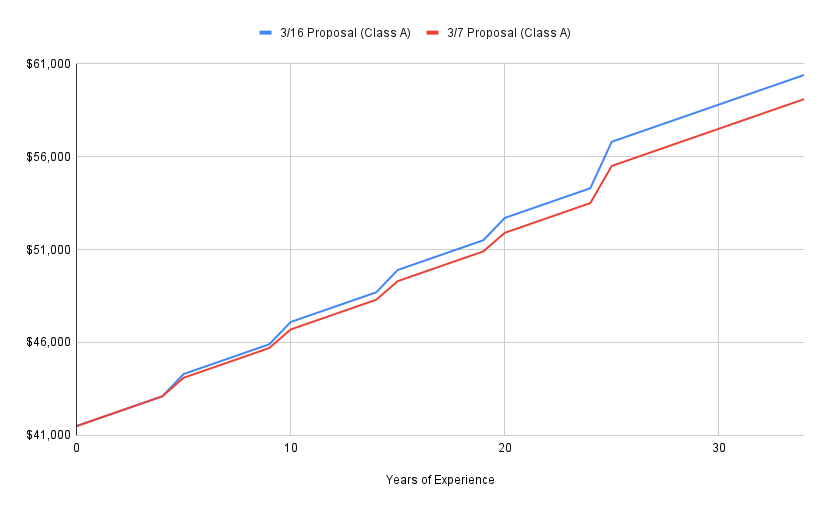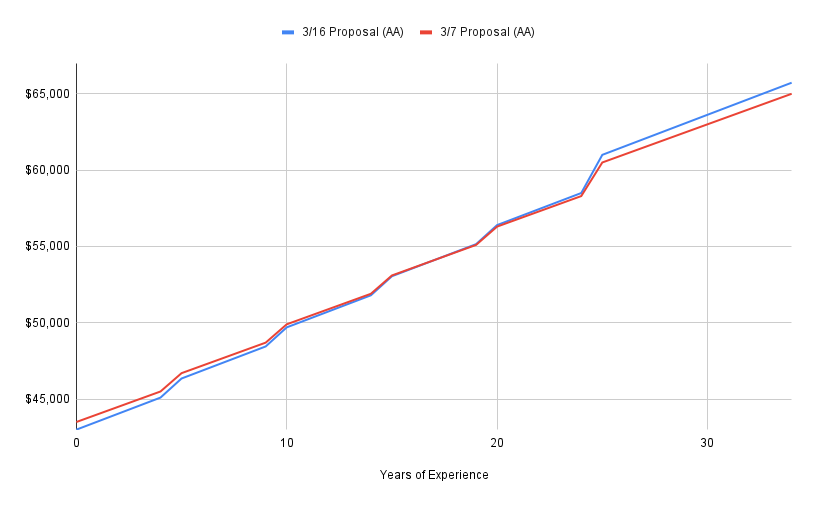Conferees from the House and Senate met this morning for the first official conference committee meeting for House Bill 530. Though the meeting ended without a final deal, there may finally be a teacher pay raise proposal that both chambers can agree on.
How did we get here?
HB 530—the only teacher pay raise bill that remains alive in the legislature—has ping-ponged between the House and Senate, with both chambers eager to insert their own proposed salary schedules into the final bill. On March 3, the House voted to invite conference on the bill, setting up a process in which each chamber names three conferees who are tasked with working out differences with the opposite chamber and negotiating a compromise bill.
Last week, the House announced at a press conference a compromise proposal featuring key aspects of both the House plan (a pay raise for teacher assistants and an immediate phase-in of raises for the 2022-2023 school year) and the Senate plan (immediate yearly step raises beginning in a teacher’s second year and an increased step raise of at least $1,000 every five years). Building on this initial compromise proposal, Senate conferees today unveiled an updated proposal that keeps all of the features of the first compromise (announced March 11) but adds an increase to the proposed five-year step raises. This updated proposal has already been signed by the Senate conferees.
What’s in the latest proposal?
The March 16 compromise has several components:
- An increase to the starting salary
- Yearly step raises beginning in a teacher’s second year
- An increased step raise every five years
- An immediate phase-in of pay raises beginning on July 1, 2022 (meaning teachers will not wait two years for the full raise)
- A $2,000 raise for teacher assistants
Based on discussion at today’s conference committee meeting, this is what the salary schedule would look like for each licensure level:
| Class A (bachelor’s level) | Class AA (master’s level) | Class AAA (specialist level) | Class AAAA (doctoral level) | |
| Starting Salary (Size of Raise) | $41,500 (+$4,500) | $43,000 (+$3,720) | $44,000 (+$3,556) | $45,500 (+$3,892) |
| Yearly Step Raise | $400 | $525 | $550 | $600 |
| Five-Year Step Raise* | $1,200 | $1,250 | $1,300 | $1,350 |
Based on these numbers, teachers will receive an average raise of approximately $5,151 and about 96% of teachers will receive a raise of at least $4,000. The average starting salary will increase to $41,650—surpassing the 2019-2020 regional ($39,754) and national ($41,163) average starting salaries. (We do not currently have figures for the 2021-2022 average starting salary, so it is unclear if the new average will surpass that.) The overall average salary for Mississippi teachers will be somewhere in the $51,000-$52,000 range, which is higher than the current overall average but lower than the regional average of $55,205. The new salary schedule, including raises for teacher assistants, would cost an additional $246 million a year. All in all, this updated proposal is much better than the status quo.
To learn more about HB 530 and to access the full teacher pay schedule, check out this detailed analysis we created. We also created this one-pager as a quick reference guide.
How does this proposal differ from the last?
According to Senate Education Committee Chairman Dennis DeBar, the only changes to the updated proposal from the March 11 compromise are $50 increases to the five-year step raises for Class A, Class AA, and Class AAA teachers. However, upon closer inspection, the updated proposal lowers the starting salary somewhat for Class AA (-$500), Class AAA (-$750), and Class AAAA (-$500) teachers. The starting salary remains unchanged for Class A teachers. (About 90% of beginner teachers have a Class A license.)
Below are graphs comparing the March 11 compromise proposal with the March 16 proposal for Class A and Class AA teachers. With every five-year step raise, Class A teachers will earn slightly more under the March 16 proposal than the March 11 proposal. Class AA teachers under the March 16 proposal begin earning less than the March 11 proposal, but they begin earning more after Year 18. It should be noted that both proposals still represent a substantial increase over the current salary schedule at all licensure levels and years of experience.

What happens next?
The conference committee meeting concluded without an official agreement, but the House conferees appeared amenable to the Senate’s updated compromise. There was certainly a shift in tone in the way the meeting unfolded compared to last week. If House conferees ultimately agree to this plan and sign the conference report, HB 530 will face an up or down vote in both chambers. If it is successful, it will go to the Governor’s desk for final approval. This may happen relatively quickly, so stay tuned. We will provide any updates on our website and social media.



Thank you for finally giving us a raise, but how come new teachers receive more than veteran teachers?
Hi, Kenyatta.
We’re sorry for any confusion. New teachers will not receive more than veteran teachers. Please see the scale for how much veteran teachers will make.
If I read this correctly, a person with a Masters degree really has no financial ambition to further their education unless it is for administrative purposes. The investment of tuition and materials would never be returned according to the pay scale. Am I correct?
Depending on the cost of the master’s degree, it may take a teacher many years to recoup their investment even with the salary bump that comes with a Class AA license and more years of experience. Whether it is worth it to an individual teacher will depend on the exact cost of the degree and any local supplement. It is certainly possible that an expensive master’s degree will not be worth it in terms of the raise.
I have been teaching for 35 years….so what would my salary be
Please see the scale for exact amounts. Teachers at or beyond 35 years make the same, as the scale does not extend beyond 35 years.
I am curious. This is my 32nd year of teaching. Will I receive the additional $2500 raise for teaching over 25 years?
Yes, all teachers over 25 years receive the $2,500 bump.
Starting teachers will be making almost what I have worked 22 years to make. This is an insult!
Hi, Lisa.
We are sorry for any confusion. First-year teachers will not make more than experienced teachers. Please see the scale for teachers in Year 22.
Thank you. It is about time that we are recognized as being the building block to the future of every successful person. Learning starts at home with parents and then it is our turn to help develop and shape each child’s mind into something much greater than anyone can possibly imagine. With love, compassion, patience, knowledge, and determination as teachers, we can and are doing this for so many young minds.
So a first year teacher makes more than an experience teacher?
5 years I have and they make more than me and I have to mentor them. This is crazy
Hi, Alyssia.
First-year teachers will not make more than experienced teachers. See the scale in the post to see what your raise will be. We hope this helps.
Thank you for this much needed raise. I have over 35 years teaching experience with a Masters Degree. Why am I not getting the $4,000 raise increase? Veteran teachers like myself were counting on this raise to help when making the decision about retirement.
Hi, Karen.
The way the legislature did the final bill only 96% of teachers will receive at least $4,000. The 4% that is receiving a smaller raise is at the upper-end of the pay scale–more advanced degrees/years of experience. Unfortunately, it sounds like you are in that group. Teachers with a Class AA and 35+ years receive a raise of $3,130.